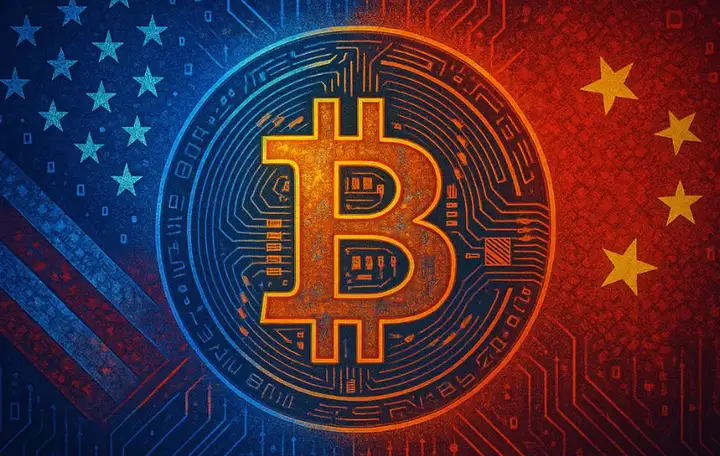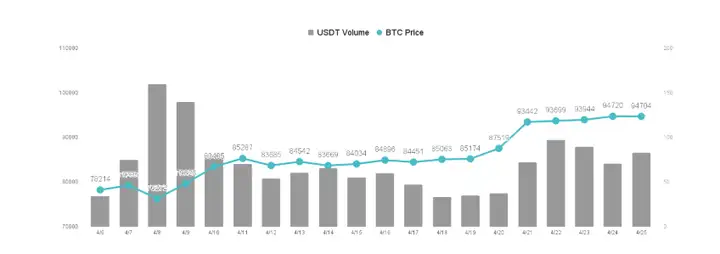Last week's market shift was highly significant for Bitcoin and the cryptocurrency market, as market funds finally began to view Bitcoin as "digital gold" and gradually decoupled from US stock trends. The price volatility quickly converged with gold, driving Bitcoin's price to directly rise to $94,000, with a weekly increase of 12%. Although US stocks rebounded, the trend clearly showed a significant divergence from cryptocurrencies.
VX: TZ7971

Due to US tariffs, fiscal, and economic uncertainties, central banks may gradually reduce their dependence on US Treasury bonds and seek alternative assets, including gold and Bitcoin, which has also driven up gold and Bitcoin prices.
The market is changing its valuation of Bitcoin, moving from following US tech stock fluctuations to gradually redefining it as a hedge option outside the US dollar, positioning it closer to value storage tools like gold. After a period of correction, the cryptocurrency market has regained vitality, sparking market speculation about a trend reversal.
However, a full recovery cannot be definitively claimed yet.
US investor confidence seems to be recovering, with Bitcoin showing signs of trend reversal since April 21. Large investors' buying has become active again, especially with whales accumulating on Binance, often signaling a market rebound. Subsequently, US investors on Coinbase showed similar behavior. Notably, the Coinbase premium representing US retail sentiment remains positive, indicating stable US market demand, suggesting a structural change in this recovery.
Due to ongoing uncertainty in US tariff policies and the freezing of Russia's $30 billion assets following the invasion of Ukraine, medium-sized countries are rethinking their reserve policies. Instead of purchasing US bonds with foreign exchange, they prefer investing in value storage tools like Bitcoin or gold. This applies to other emerging countries as well, increasing demand for assets unrelated to traditional markets. Bitcoin, like gold, is viewed as a hedge asset, with global investors seeking assets that perform differently during crises.
Bitcoin's correlation with US stocks is gradually decreasing, indicating its development as a global value storage asset. Bitcoin is progressively acquiring gold-like hedging functions, attracting institutional investor allocation.

Trump's Softened Stance May Pause Bitcoin's Rally
In the US-China tariff war, the US is clearly at a disadvantage, heavily relying on low-cost resources. Last week, Trump continuously signaled ongoing communication, first suggesting possible tariff reductions on specific goods, then leaking potential China tariff reduction rumors through the White House and media. If the other party doesn't respond or refuses, he can dismiss it as a rumor while saving face and preserving negotiation leverage.
However, US-China tariff tensions remain a focus, with Wall Street hoping for signs of relationship easing. A Friday report indicated China quietly canceled tariffs on some US semiconductors to relieve pressure on its tech industry.
If trade negotiations progress, China might exempt tariffs on US ethane and liquefied petroleum gas (LPG).
Despite China's public hard stance, Trump's attitude last week was relatively mild. Trump stated that the US and China have been in contact, showing the US's unilateral desire to negotiate, extending goodwill and appearing conciliatory.
The tariff war may end faster than expected, which is not entirely favorable for Bitcoin's current positioning as digital gold or its continued rise. Considering Trump's attitude and series of conciliatory actions, and with US top three suppliers estimating current retail shelf inventory can support about two months of sales before costs significantly increase due to tariffs, Trump must reach negotiation agreements within a limited timeframe.
This explains why Trump suddenly announced implementing reciprocal tariffs on countries not reaching agreements within 2-3 weeks, instead of the previously promised 90-day exemption period. The US side faces time pressure; if tariffs drag on, US costs will significantly rise, driving US prices up and certainly increasing public discontent.
If so, Trump's chances of winning next year's midterm elections are almost impossible. The US's time is counting down, with high challenges, likely forcing concessions to major economic entities like China and the EU. Therefore, the current Bitcoin price rise might be a good point to take profits, as US dollar confidence will slowly recover after the tariff war ends, potentially making Bitcoin's digital gold positioning less favorable for further increases.





